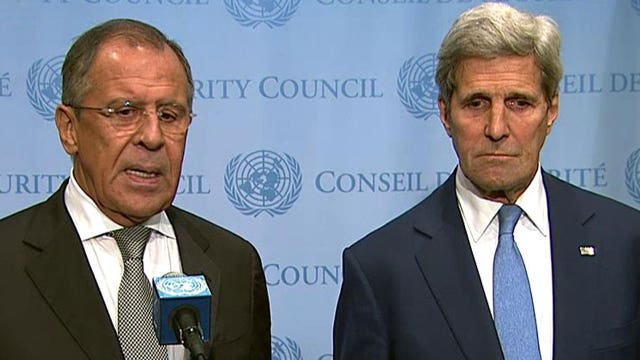Kerry, Lavrov address media following 'constructive' meeting
Recognize need to 'de-conflict' situation in Syria, agreed that US, Russian militaries should hold conference
Defense Secretary Ash Carter, visibly frustrated at Russia's air campaign over Syria, warned Wednesday that while he's taking "the Russians at their word" about their intentions in the country, he thinks the strikes will "backfire" and only serve to "inflame" the civil war.
Further, even as he indicated he might trust the Russians' statements, Carter challenged Moscow's claims that they're limiting strikes to Islamic State targets. Without going into specifics, Carter told reporters it appears Russian airstrikes Wednesday "were in areas where there probably ... were not ISIL forces."
Russia escalated the Syrian conflict early Wednesday by launching an aerial bombardment against opposition targets inside Syria. The Obama administration -- whose officials, including President Obama himself, met with their Russian counterparts in recent weeks to discuss Syria -- appeared to be caught off guard by the development.
Top administration officials on Wednesday delivered a nuanced message to Moscow in response. Earlier in the day, Secretary of State John Kerry told the United Nations Security Council the U.S. would not object to Russians hitting Islamic State or Al Qaeda targets but airstrikes just to strengthen the hand of Syrian President Bashar Assad would be worrisome.
Carter appeared to take a somewhat tougher tone, in saying it appears Russia already is hitting areas with no ISIS forces. He said the underlying problem is Russia is trying to both fight ISIS while supporting Assad, which he said would only escalate the civil war. This approach, he added, creates the potential for striking non-ISIS locations.
"The result of this kind of action will inevitably simply be to inflame the civil war in Syria," he said. "It's ill-advised to take this kind of action in support of Assad, only without pursuing a political transition."
He said the approach is "doomed to failure" and "tantamount" to "pouring gasoline on the fire."
Kerry and his Russian counterpart, Foreign Minister Sergey Lavrov, appeared together at the UN late Wednesday to discuss their just-completed meeting, which Kerry described as "constructive."
"We agreed on the imperative to, as soon as possible, have a military to military deconflicting discussion," Kerry said.
He added the pair had also agreed it was "imperative to find a solution to this conflict to avoid escalating it."
Earlier, White House spokesman Josh Earnest said the new Russian action "calls into question their strategy, because when President Putin and President Obama had the opportunity to meet at the U.N. earlier this week much of their discussion was focused on the need for a political transition inside Syria."
He also said "Russia will not succeed in imposing a military solution in Syria any more than the United States was successful in imposing a military solution on Iraq a decade ago."
Kerry said Russian operations must not support Assad or interfere with those of the U.S.-led coalition that is already attacking Islamic State targets. He called for an urgent start to military-to-military talks to prevent any kind of conflict between Russia and the coalition, suggesting they begin this week.
Both he and Carter also made clear that they would not accept Russia's appeal for U.S. warplanes to leave Syrian airspace during Russian missions.
"These strikes will continue," Kerry said.
Meanwhile, Russia's aerial bombardment against Syrian opposition targets raised bipartisan alarm on Capitol Hill -- with some echoing concerns that Russia's airstrikes will not distinguish between Islamic State targets and moderate opposition forces.
"These airstrikes are indiscriminate in nature," Sen. John McCain, R-Ariz., said.
McCain delivered a blistering floor speech on the developments in Syria, blasting what he called the Obama administration's "leading from behind" approach.
He said the war has "now created a platform for a Russian autocrat to join with an Iranian theocrat to prop up a Syrian dictator."
A senior U.S. defense official said a Russian official in Baghdad informed U.S. Embassy personnel Wednesday morning that their military aircraft would fly "anti-ISIL missions" over Syria.
"He further requested that U.S. aircraft avoid Syrian airspace during these missions," the official said -- a request that apparently was rejected.
"While we would welcome a constructive role by Russia in this effort, today's demarche hardly seems indicative of that sort or role and will in no way alter our operations," the U.S. defense official said.
Fox News' Jennifer Griffin and Lucas Tomlinson and The Associated Press contributed to this report.





